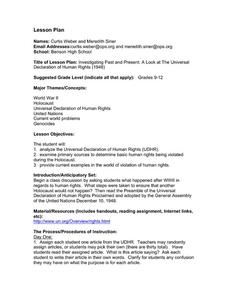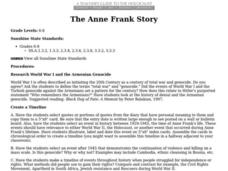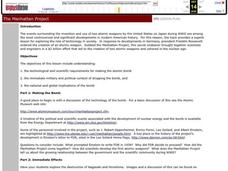Curated OER
Post-War Suburbanization
Students research the suburbanization of post World War II America. They identify factors aiding suburban growth and assess the degree to which it impacted American life. Students view a documentary about the benefits of...
Curated OER
Inventions Change the World: The Enigma Machine
Third graders explore WWII by analyzing technological advances. In this invention instructional activity, 3rd graders discuss the use of the Enigma machine which decoded private German messages that communicated with U-boats. Students...
Curated OER
The History of the Holocaust From A Personal Perspective
Students research and identify how Holocaust events affected lives of real people who lived in Europe from 1933 through 1945 and after, and create original artwork, poetry, and essays that reflect understanding of Holocaust, and its...
Curated OER
Yellow Journalism
Seventh graders investigate yellow journalism and how it affected public opinion and the government during the Spanish American War. They define key vocabulary words, and take notes during a teacher-led lecture. In pairs they read...
Curated OER
What is War?
High schoolers establish what war signifies to them. They demonstrate this by voting on statements. Students are invited to ponder about how they feel about issues, their world history, and to defend their positions.
National First Ladies' Library
Martha Goes To War!
High schoolers investigate how women went to war and the contributions that they have made in history. They conduct research using a variety of resources. The information is used in order to create a class presentation and answer some...
Curated OER
Basic Crypto Systems II
Ninth graders discuss the Enigma machine used during World War II. They explore the substitution cipher and variations of it. Students examine the advantages and disadvantages of this cipher. Students write a message using the code...
Curated OER
Investigating Past and Present: A Look at The Universal Declaration of Human Rights
Students compare the Universal Declaration of Human Rights to the war crimes of WWII. In this lesson on Human Rights, students evaluate the causes of WWII, war crimes, and determine whether the outcome might have been different otherwise.
Curated OER
Teaching About Peace Through the Cranes of Hiroshima
Students listen to the story of "Sadako and the Thousand Paper Cranes." They discuss the events of Hiroshima, effects of the bombing, and methods people can make a difference in achieving peace in the world. Students use orgami paper and...
US Institute of Peace
Perspectives on Peace
Is peace simply the absence of war, or is there more to the story? Young social scientists define peace in the second installment of a 15-part series. Groups work together to explore cultural concepts of peace and the peacemaking process...
Curated OER
Hitler's Fatal Gamble
Young scholars consider the differences between totalitarianism and democracy. In this comparative politics lesson, students will read a handout describing the major components that comprise totalitarianism and democracy, then they...
Curated OER
U.S. Immigration Policy and Hitler's Holocaust
Young scholars read about immigration to the U.S. during the Holocaust. In this immigration instructional activity, students write answers to discussion questions. Young scholars role play members of the 1951 U.N. conference and...
Curated OER
The Ethics of the Bomb: What Would You Do?
Learners research the use of the atomic bomb in WWII, analyze the human costs of dropping the bomb and identify the pros and cons. They develop a PowerPoint presentation on the effects of an atomic bomb dropped on their hometown.
Curated OER
People in History- Anne Frank
Students examine discrimination and what it was like during WWII and today. In this writing and analyzing lesson, students read pasages from Anne Frank's diary and find connections between Anne's life and the life of people in...
Curated OER
American Justice on Trial
Young scholars role play a trial in which they consider if the United States government violated the rights of Japanese Americans after Pearl Harbor.
Curated OER
The Anne Frank Story
Middle schoolers read Anne Frank or other first person or autobiographical accounts of experiences during the Holocaust and produce biographical sketches of the authors.
Curated OER
Genocide: Past & Present
Students visit the Holocaust Musuem through an interactive program. They examine Hitler's Final Solution and where concentration camps were located. They analyze how the situations in Auschwitz are similiar to Darfur.
Curated OER
Number the Stars, by Lois Lowry. New York: Dell 1990
Students recognize courage and heroism of Danish and Swedish people and all others who resisted the Nazis, realize that everyone has the capacity to do good as well as evil, and analyze reasons and motivations that caused certain people...
Curated OER
The Diary of Anne Frank
Sixth graders explore journal writing. In this writing lesson, 6th graders use the published diaries of Anne Frank and discuss the entries in her journal. Students write in their own journal for a week and create a one page summary on...
Curated OER
Number the Stars
Fifth graders examine threat to all people (particularly the Jews) resulting from the imposition of Nazi authority, and appreciate the courage exhibited by ordinary people acting out of conscience.
Curated OER
The Manhattan Project
Students discover the technological and scientific requirements for making the atomic bomb, the immediate effects of an atomic bomb, and the social and political changes that have resulted from the Manhattan Project.
Curated OER
Characteristics of Anne Frank
Eighth graders read selected passages from The Diary of Anne Frank. Working in pairs, 8th graders determine what qualities and characteristics they would assign to her from their selected diary entry.
Novelinks
The Book Thief: Anticipation Guide
Introduce the major themes in Markus Zusak's award-winning novel, The Book Thief, with an anticipation guide that asks readers to agree or disagree with a series of statements.
Curated OER
War and the Media Press Freedom vs. Military Censorship
Students analyze the relationship between war and media. In this media awareness lesson plan, students listen to their instructor present a lecture on freedom of the press and military censorship. Students participate in an activity...
Other popular searches
- Causes World War Ii
- World War Ii Map
- World War Ii Holocaust
- World War Ii Battles
- Post World War Ii
- Propaganda World War Ii
- Causes of World War Ii
- World War Ii Newspaper
- World War Ii Veterans
- Allies in World War Ii
- World War Ii Geography
- Post World War Ii Asia























